There’s a running joke in Austin, Texas, that nobody is actually from there. While that’s not true, of course, in a city where it seems most people just arrived yesterday, Danielle Skidmore, 46, is one of the rare ones who has called Austin her home since 1994 when she moved there from Wisconsin.
Austin has boomed in the last 10 years or so, but a few decades ago, it was a college town that was much smaller and far more affordable. Skidmore has watched the Texas capital change dramatically, and as a transportation engineer, she knows first-hand about its intense growing pains and increasingly horrendous traffic jams.
While Austin’s popularity and population has surged thanks to its laid-back liberal attitude, vibrant music and food scene, and nonstop lineup of festivals, the city faces huge challenges due to skyrocketing housing costs and an infrastructure that’s bursting at the seams.
Skidmore has spent the past 24 years working in Austin as a civil engineer for public-sector clients, trying to solve some of these infrastructure and transportation problems. As the parent of a teenage son who is a nonverbal quadriplegic, she also deeply understands the city’s limitations when it comes to accessibility.
In addition to her identities as an engineer and a special needs parent, Skidmore also owned her identity as a transgender woman when she came out several years ago. Last year she became very involved in efforts to try and stop the bathroom bills the Texas government attempted to pass twice. After spending so much time at the Capitol, friends and fellow activists urged her to consider running for office. She immediately thought about Austin and its traffic problem, and she saw a place for her voice on Austin City Council. Not only did she have a unique perspective on the LGBTQ+ community and special needs accessibility, but she would be the first transportation engineer on the city council.
Skidmore’s dear friend Alicia Roth Weigel, a progressive political activist who used to work for Democratic icon Wendy Davis, encouraged her to go for it. They met at the Capitol last summer, and a few days later Skidmore helped Weigel come out as intersex, so they share a unique bond. The two joined forces: Skidmore quit her job to run for office, and Weigel serves as Skidmore’s campaign manager. The scrappy team is trying to unseat the incumbent in Austin’s District 9 on November 6, and it hasn’t been easy. After an impromptu interview with conservative radio host Steven Crowder, the pair have received hundreds of threats of violence and death, but they keep persisting.
This is Skidmore’s story of coming to terms with her trans identity, deciding to run for Austin City Council, dealing with the haters, and working to make her beloved home a better place.
Profiles in Pride: When did you realize you were transgender, and what did coming out look like for you?
Danielle Skidmore: The short answer is I always knew I was different, but I didn’t have any context for it for a long, long time. I used to grab my sister’s clothes and hide in the bathroom as a really young child and try them on. But in terms of coming out to myself, I was 37, so about nine years ago was when I finally admitted to myself that I am trans. But even then, I was terrified of the word.
Whenever I would crossdress, I had this pattern of feeling at peace with being female. It was my deepest, darkest secret that was just wrapped in shame. I would resist doing it. I never left the house when I did do it; it was always just a piece of clothing here or there.
But my son Peter and my ex-wife Melissa would go away for a week or two in the summer to Wisconsin. The time leading up to that was always this weird mixture of anticipation and guilt, because it was the only time I ever really had more than an hour or two to explore gender.
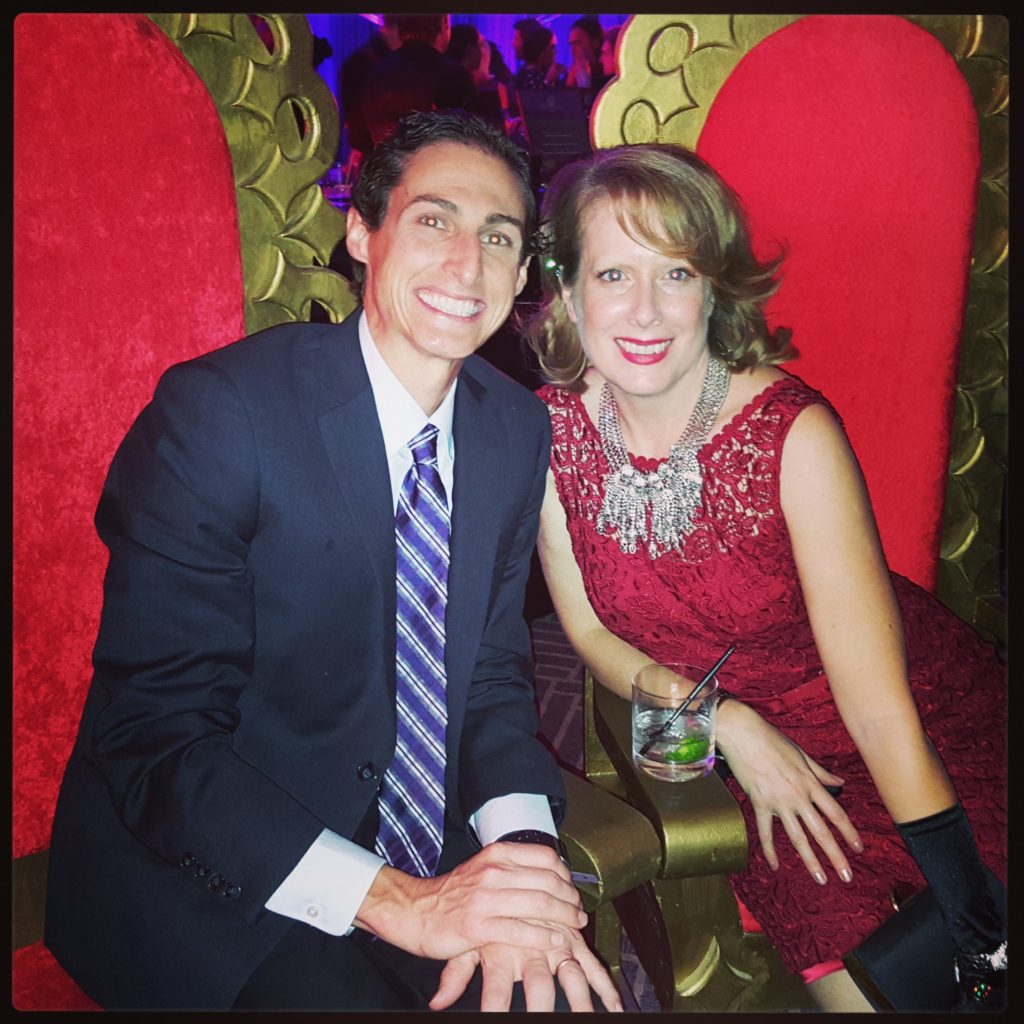
Nine years ago, I remember dropping them off at the airport and being excited that I could crossdress or paint my nails. It’s a common thread in so many trans women’s stories. That year I bought a book called “My Husband Betty,” which was written by the spouse of a crossdresser. I got it because I always wanted to understand this in the context of Melissa.
While they were gone, I read the book cover to cover in one sitting. I just cried and I cried, and I realized “this isn’t what you do, this is who you are.”
I knew I had to tell Melissa. About a week later when I went up to join them in Wisconsin, I came out to her as a crossdresser. I didn’t use the word trans yet.
By that point, I’d already found my name Danielle. Then I spent five of the last nine years desperately trying to not be trans. It was almost like “don’t ask, don’t tell” in our house. At least I no longer had the shame of hiding something, but from an early moment I knew it was going to be incompatible with my relationship. Because of that, and the stakes were so high, I tried to compartmentalize and keep it in a box — both literally and figuratively. The few things I owned, I had in shoe boxes up at the top of the closet, and they’d occasionally come down.
It was like a bargain I made with myself, to have only small doses of it. It’s what some other people who are trans call “the middle path.” They recognize who they are, but also recognize how it affects the rest of their life. Over those first five years, I’d take little steps here and there. When I was away on a business trip to Dallas, I worked up the courage to go out as Danielle and go see a drag show. I’d never been in a gay bar before, and I was treated as a woman. It was really powerful, because there was a sense of peace I’d never felt. Gender dysphoria was such a part of my life, this noise I’d feel — this emotional wake. It’s like people that live with chronic pain; it’s there and they just sort of cope with it and in a way, become numb to it.
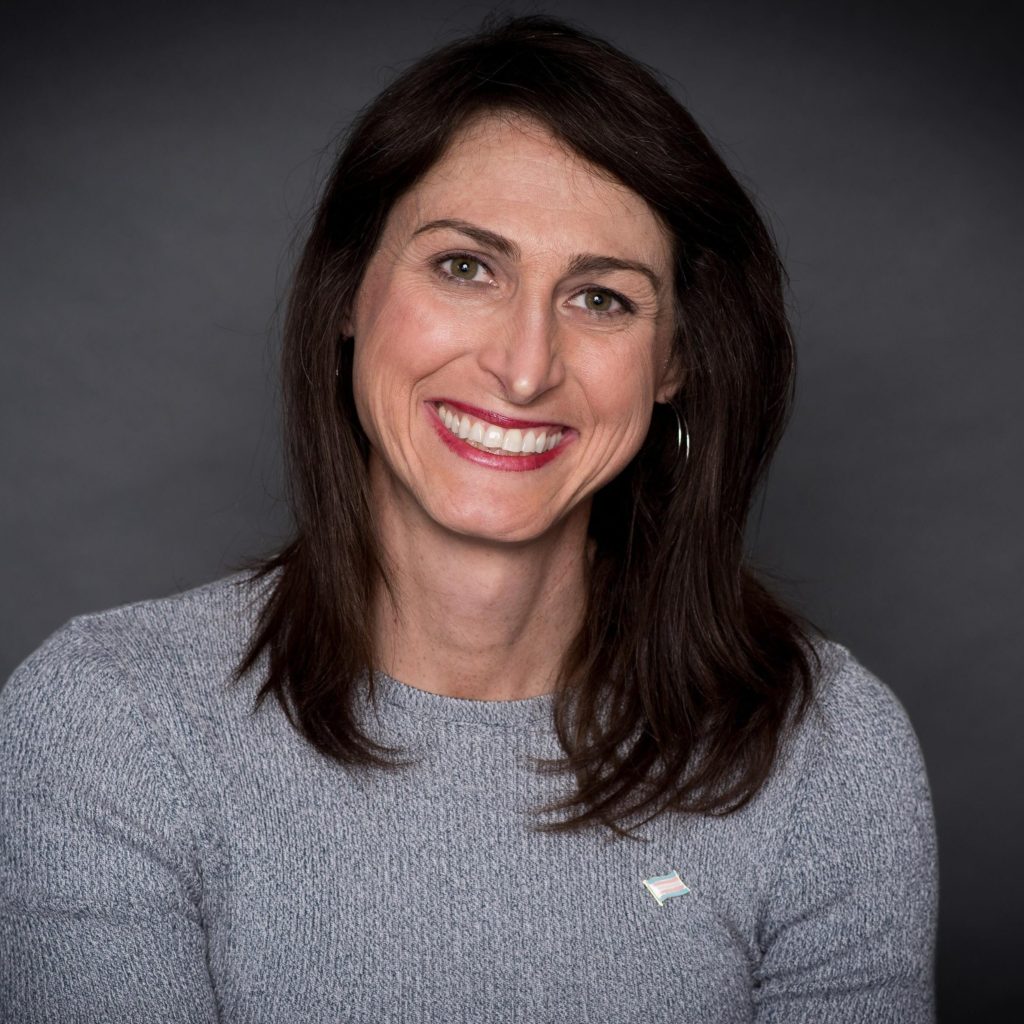
PIP: Absolutely. When did you fully come out and start living as Danielle?
DS: It was a journey. At the end of 2014 on New Year’s Eve, Melissa and I went out for a drink and were talking. She said, “2015 will be the year you deal with your shit.” I smiled and said, “Yeah, it needs to be.” She said no matter what happens, we will always be best friends. It was the weirdest moment; it was like, oh my gosh, I’m breaking up with my wife of twenty-something years. We both felt a strange peace and clarity in a way.
So the start of 2015 was the moment when I started really doing the work to own myself. I’d say 2015 was the year of coming out to everyone important. It culminated at the end of the year with me traveling home to Pennsylvania to tell my parents the week before I started HRT. Then 2016 was letting everyone else know what was going on. I transitioned at work in the summer of 2016.
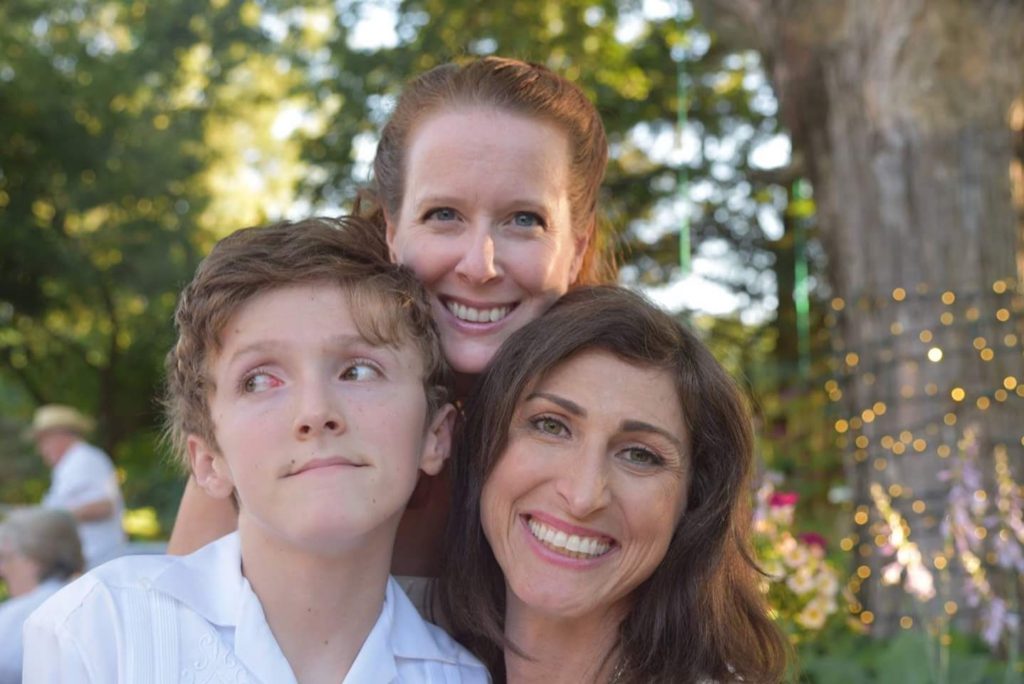
PIP: Why did you decide to quit your job as an engineer and run for Austin City Council?
DS: The summer of 2017, after spending an awful lot of time all spring and summer fighting the bathroom bill at the Capitol, that whole experience really drove home the truth about so many things — about our political process America, but also that we have to step up and fight for what we believe in.
In Austin, yes, that’s coming forward and fighting for our Austin values as a progressive city and a place that’s welcome and inclusive. But also recognizing that in spite of everything that’s wonderful in Austin, we have real challenges here. Owning that or appreciating that in the context of my professional experience as a civil engineer, solving public infrastructure problems and really looking at the two together and saying to myself, “You have a really important voice on council professionally as somebody who has worked on these real physical puzzles for Austin and for Texas, and you have this unique place of listening to all sides on an issue.” Of really valuing what it means for representation.
That together started to really well up last summer, and then through the fall, as an engineer, I started thinking of the logistics of how it would work. I had to come out to Melissa again, this time as a politician, and she was surprised. I did the same thing to my boss; I walked into her office and closed the door. She said, “Oh my goodness, are you OK?” I said, “I need to come out.” She rolled her eyes and said she thought I’d already done that. I said, “I think I might be a politician.”
It was just like my transition in a way. Every time I came out to someone with this idea, what I got was, “You’d be really good and it would really amazing; your representation and your skill set would be wonderful, but it will be hard.” In January of 2018, I had to be very methodical with the process of coming out as a politician at work. I made a coming out plan that involved me resigning, and I had to leave the company that I helped build.
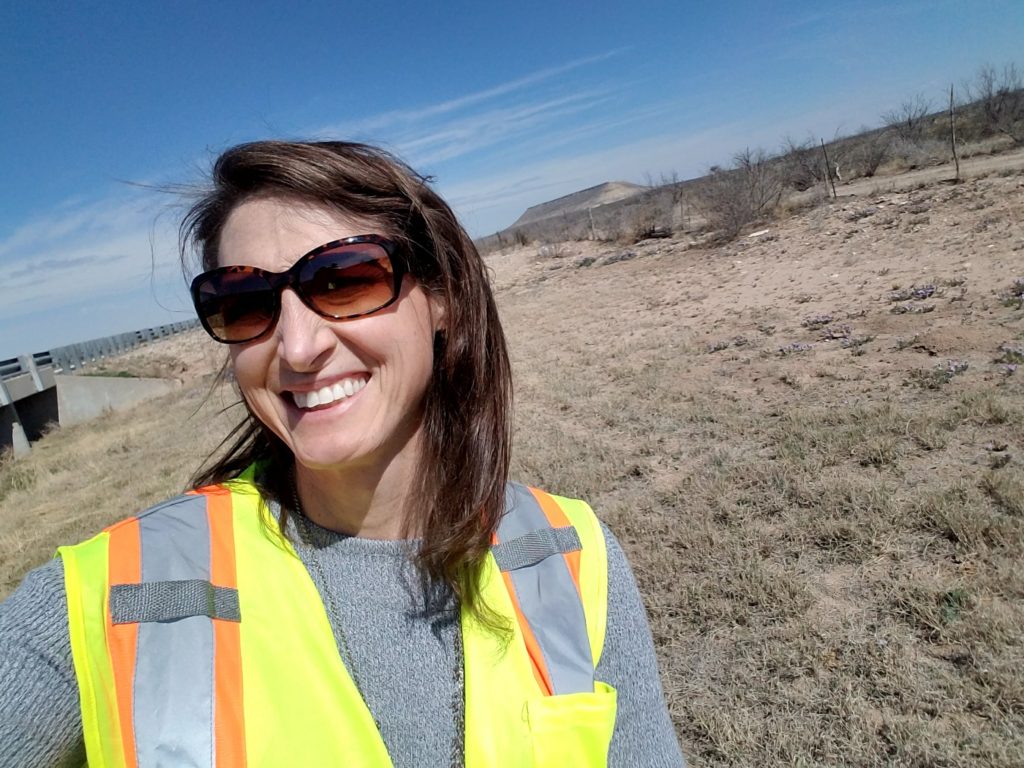
In Texas, there’s no employment protection for someone seeking elected office. There’s a reason there aren’t many engineers that have served in elected office. But this has always been my frustration, because major engineering and planning policy is made by our elected representatives. I wanted to take my engineering experience and connect that with what I think is right for the city and for the people of Austin in terms of how we grow and the investments we make in transportation. I happen to believe we have to go big in public transportation, and in many ways, that is challenging the status quo. When I say things like questioning whether spending $8 billion on I-35 without greater public conversation is the best investment of our transportation money — that’s very uncomfortable for some, because I’m challenging the system.
That’s the puzzle, really. I’m realizing every day that politics is basically about building coalitions and seeking affirmation and having people like you. But it’s also about doing what’s right. It’s listening to all voices. Making the right decisions and then owning those decisions. That’s so much harder to do than it is to say.
PIP: Definitely. How does being the parent of a disabled child also give you perspective on accessibility issues in Austin?
DS: As much as being trans informs how I look at the world in terms of seeing things from the perspective of being othered, I’m the parent of a special needs child, Peter, and it has real physical challenges. He’s a nonverbal quadriplegic. We’ve learned how to overcome obstacles. From a physical standpoint, when you talk about accessibility and how our city grows, and accessibility in our neighborhoods and sidewalks and accessibility of housing, it’s always taught Melissa and I what works and what doesn’t.
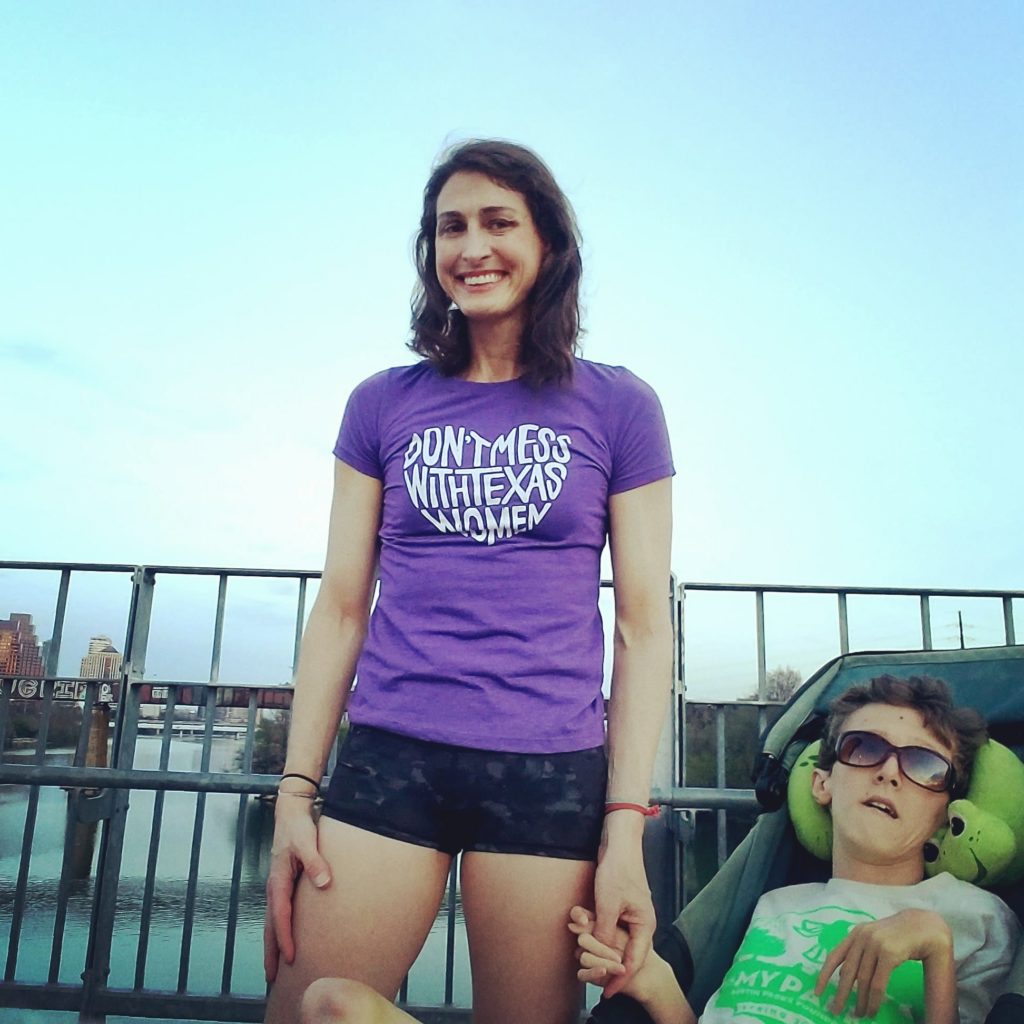
I don’t know what it’s like to have those kinds of physical disabilities. I have a small glimmer of what it’s like to face some of those obstacles with the privilege that comes as I’m pushing the wheelchair, and I think, “This sidewalk isn’t wide enough and this curb cut doesn’t work,” but I’ll just pop that curb because I’m still strong enough to do that. That certainly gives us as a family an appreciation, so when people say, “We need to do our sidewalk plan,” the difference between talking about it and actually doing it means something to me. I find myself coming back around to, “Let’s say these things and actually do these things, not just study them.”
PIP: Can you talk a little about Alicia and what she brings to your campaign, both as an intersex advocate and an experienced political advocate?
DS: Alicia helped me come out as a political candidate. She was among the first people I talked to about trying to take this engineering career and this experience as a special needs parent, and how I could apply this to Austin, the city I love. She saw me, as it were, very early. She’s always been part of ‘how might this work?’ In Austin, this wonderful, progressive city that we are, our campaign is still viewed by some as insurgent, because we have the audacity to run against an incumbent.
What we see here is what we’re seeing in races all over the country this year, with amazing women like Alexandria Ocasio-Cortez in New York or Ayanna Pressley in Massachusetts, who are actually pushing back against the establishment, even in the Democratic party.
In Austin, even though it’s a nonpartisan race, District 9 of Austin is very much operating like a Democratic primary. We always knew the campaign was going to be insurgent, so what better person to manage an insurgent campaign than a 28-year-old badass intersex and women’s rights advocate who has a lot of experience building organizations and who’s worked with Wendy Davis? With her and I, it really is the right fit. It’s been a privilege to work with her. We challenge each other, and I don’t know that I would have done this without her, to be totally candid.
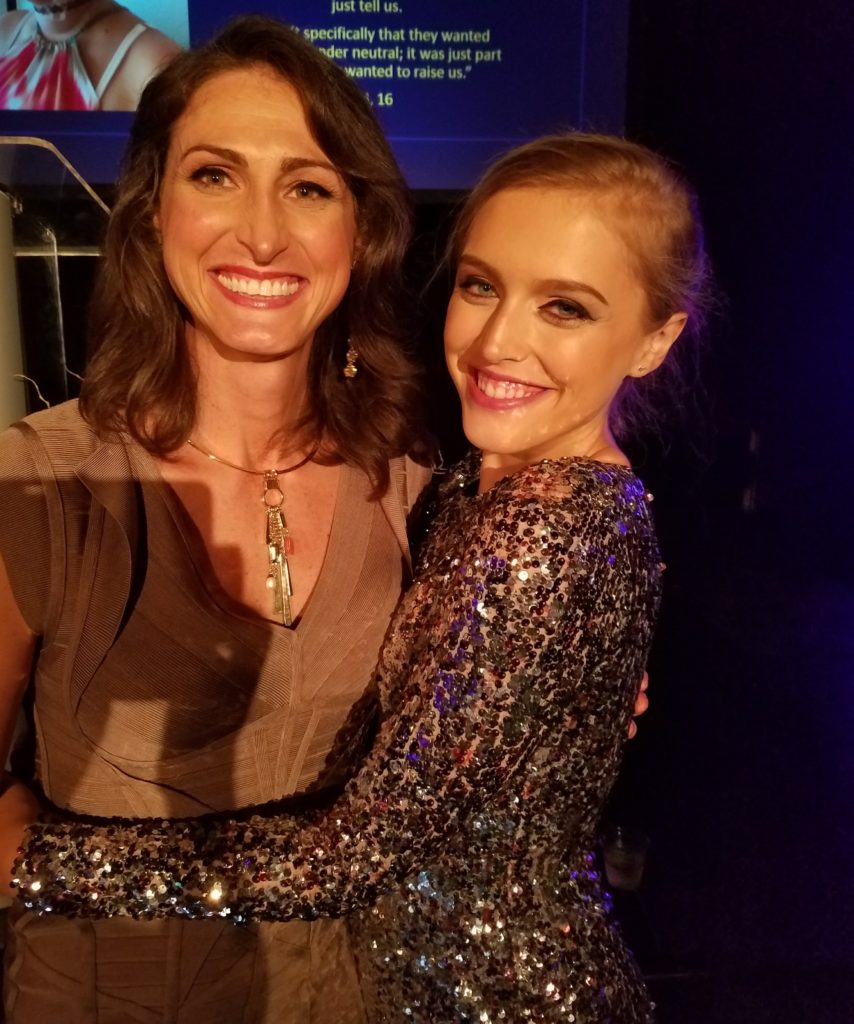
PIP: You two were interviewed on the street by a conservative radio host who was trying to “prove” there were only two genders, and you both got lots of death threats. How do you handle this hate?
DS: As an out and proud transgender woman in Austin, Texas, I’m still white and I’m still a professional, so although I gave up a lot of privilege, I’m still fortunate. I guess the way I approached that interview with Steven Crowder was a lot like the way I approached things at the Capitol last spring when I sat in the hallway and talked to a conservative minister, who was polite enough to me. But he’d say with a smile, “Miss Danielle, I love you, but you are going to hell.”
I decided to respond to that by sharing my life and being open, authentic, and honest. In doing so, maybe I won’t convince that minister. Maybe I won’t change Steven Crowder’s mind; he doesn’t have any investment in that because he makes a lot of money by not changing his mind. But for the people around them.
Like at the Capitol, there was a busload of women who came down with the minister to fight for the bathroom bill. They’d be sitting there listening to the conversation that I was having with this minister. It was surreal; I’d look at the women and say, “You know, it’s OK, you’re allowed to ask me a question too! You don’t need permission from the minister!” What was amazing to me was watching their eyes and watching them, and seeing them learn something and start to maybe appreciate my lived experience.
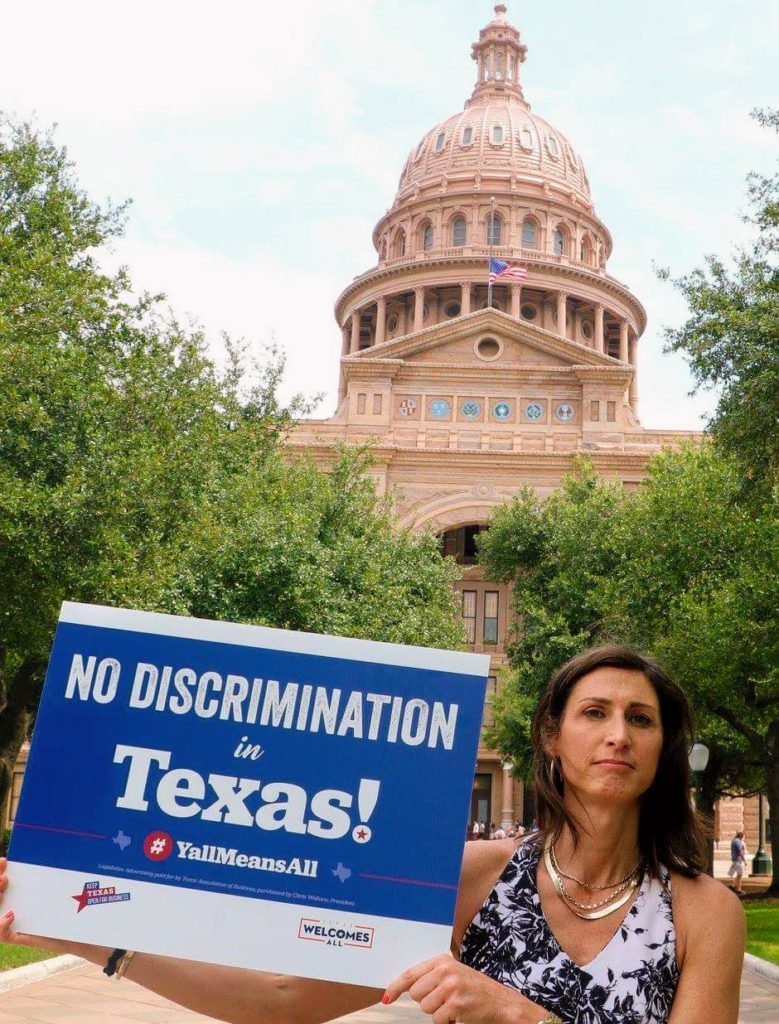
So when we get feedback from the Crowder interview, that’s where I feel like if I can be authentic — and I’m lucky that for me, that comes with much less downside than so many others — then I’m going to do that. Trolls are going to be trolls. Maybe I’m naive, but I don’t worry too much about my personal safety. The other piece too that’s an uncomfortable truth is I’m a middle aged transgender lesbian. I didn’t get as much of the hate that came from that video, because the people who watched the video and who were spewing the hate don’t see me as a woman.
A lot of the compliments were like, “Wow, I really like Danielle, because he was really respectful and logical because clearly he’s a man,” as if it’s a positive thing! The patriarchy is real. So I didn’t put up with a lot of it because they think I’m still part of their club. How messed up is that?
Compare and contrast that with Alicia: they denied her legitimacy as an intersex woman. In most cases, they didn’t even appreciate what intersex is. Many of the people who complimented me because I’m rational and logical and I’m clearly a man said, “Well, Alicia is a fraud because she’s a woman.” Then they went right into all of the misogyny that women face, so Alicia dealt with so much more hatred than I did, which is just tragic, because her femininity was never challenged by them. But Alicia is an attractive young woman who is also brilliant and fierce, and as a result, so many of the haters had to reconcile with that.
That speaks just volumes to what we’re trying to unpack in the world. For me, when I talk to my ex-wife about it — now we are best friends just like we said we’d be four years ago — we just laugh and roll our eyes and say, “Welcome to the patriarchy!” There’s something about being a woman of a certain age that changes the conversation in ways that are complex. Because I’m not really seen by many of these men as an object of desire, then I don’t put up with as much as crap, either.
PIP: Wow. That makes sense. To wrap up, let’s get back to your campaign: what sort of changes do you hope to make in Austin?
DS: We are the eleventh largest city in America, and as wonderful as it is to live in Austin, we have huge transportation challenges. I’m always smiling when I say it, but I’m most excited about being the first transportation engineer ever to serve on the Austin City Council. We have to make difficult choices moving forward.
First and foremost, I want to be an unapologetic voice to help Austin grow and develop a comprehensive transportation system that is sustainable. That involves going big on public transportation.
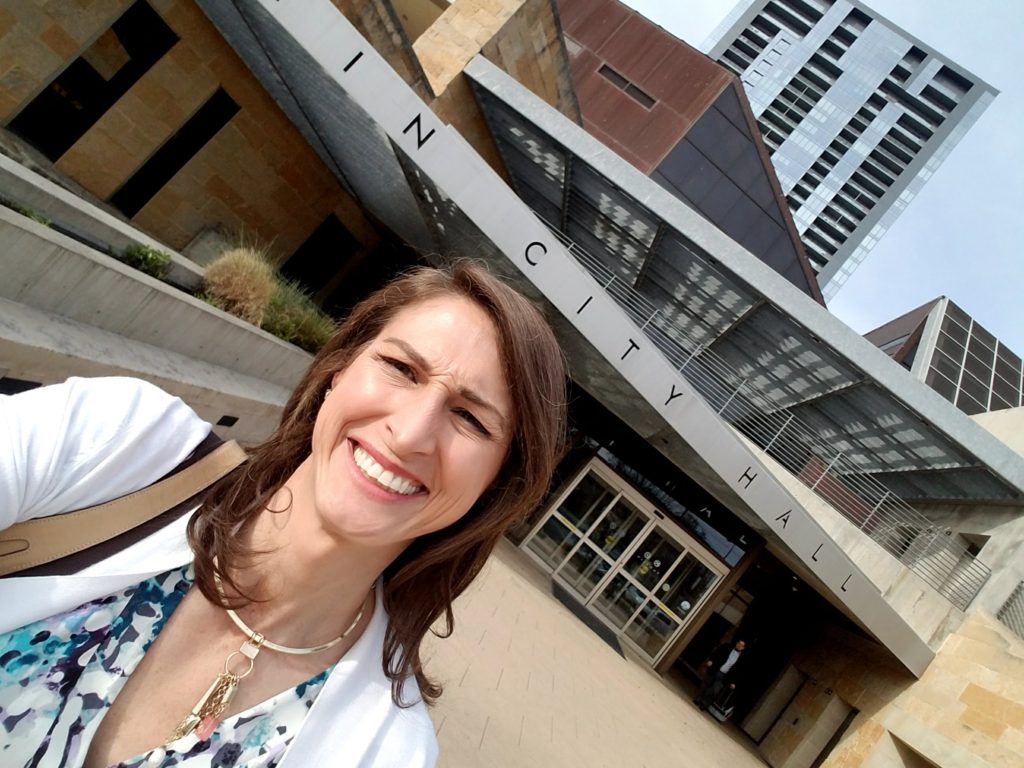
Transportation and land use are absolutely connected, and it means continuing to work to find more places for people to live in Austin, and we haven’t done a good job with that, especially over the last decade and the last two terms my opponent has served. On mobility, it hasn’t gotten easier to move around Austin; traffic has gotten worse, and our affordability has gotten worse. A big part of why our affordability has gotten worse is because we’re not building enough places for people to live and we’re not building a diversity of housing.
Those two issues result in, “What does it mean to be a sustainable city?” Climate change is real, and in Texas we have more droughts with greater frequency, and when we break the drought, we have greater floods. Again, we have to own that fact, and that we’re going to have to accommodate wider floodplains, which is true in San Antonio, too. Especially our vulnerable communities that are working class and poor; they’ll be in greater and greater danger, so we have to find someplace for people to live.
The last point is that all of this comes back to the question of equity. When we call ourselves a progressive city, what does that truly look like? How do we make decisions that set policy so that everyone can thrive in Austin? For me in the district that I’m running in, that starts with making more space for affordable housing, even in District 9, the wealthiest district in Austin.
Keep up with Danielle and her campaign on Instagram @danielleforall or on Facebook.

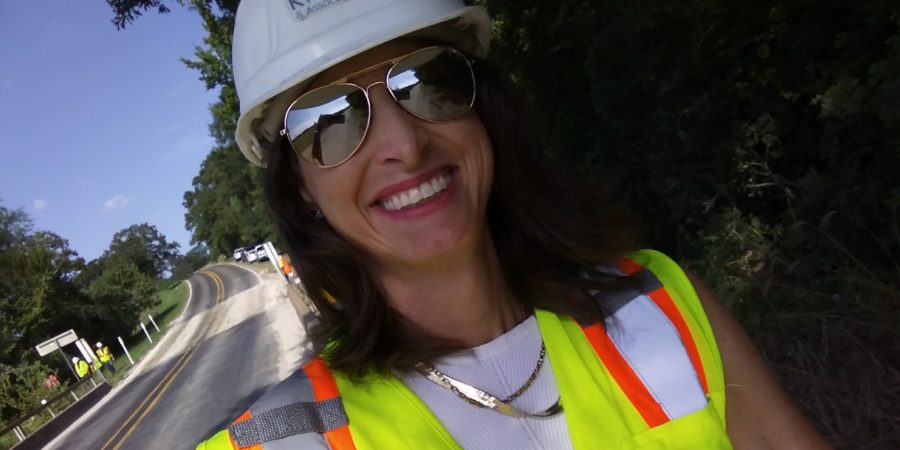
I loved this article. Stay fierce friends!